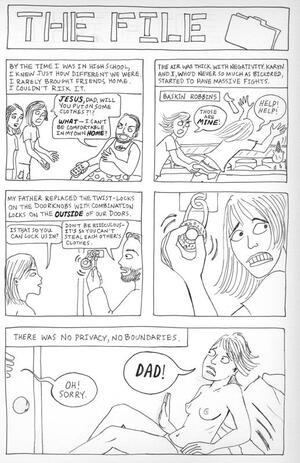Graphic Details: Interview with Laurie Sandell
Graphic Details: Confessional Comics by Jewish Women is the first museum exhibit to explore this unique niche of autobiographical storytelling by Jewish women. The touring exhibit, sponsored by The Forward, features the work of 18 Jewish women artists. The Jewish Women's Archive is interviewing each of the artists about their work and their experience as a female, Jewish graphic artist.
This week's interview is with Laurie Sandell, a freelance magazine writer and "graphic memoirist." Sandell has written for Esquire, GQ, Glamour, New York, Real Simple and InStyle, among other publications, and her cartoons have appeared in Glamour, New York and The Wall Street Journal. Her graphic memoir, The Impostor’s Daughter, was nominated for a 2010 Eisner Award.
Q: How did you get into cartooning?
Laurie Sandell (LS): I started between the ages of seven and ten, drawing cartoons for (and of) my dad. They looked like the type of caricatures you would get as a party favor at a Bar Mitzvah--my father has a huge head in every drawing--but they were really dark. In one, he is gaping at a shower full of naked women; in another he is squeezed into a dog cage, waiting to be fed; in yet another, he is sitting on the floor, slack-jawed, as my mother parades purchases in front of him (a sign on the wall reads, "Women Are Money.") I never planned to cartoon professionally, though; I just kind of fell into it. I was working at Glamour and drew a card for the editor-in-chief to congratulate her on the birth of her daughter. She then asked me to pitch her some cartoon ideas. That led to my graphic memoir, and later, graphic profiles for New York Magazine and The Wall Street Journal.
Q: How does your Jewish identity influence your work?
LS: My family is Reform, as in very, very Reform. My father's extended family perished in the Holocaust but he also attended Catholic schools in Argentina and seems to know next-to-nothing about Judaism. So growing up, Judaism wasn't pervasive in my life; it was something I learned about later. I did live in Israel for two years after college, but I always felt like an outsider and a tourist. I never had that feeling people talk about where they come to Israel and feel like they've come home. Quite the opposite, actually. On the other hand, I'm extremely confessional. I write personal essays for magazines and have published a memoir. And that seems like a very Jewish thing to do.
Q: Do you think the experience of being a cartoon artist is different for men and women?
LS: I don't think I can really answer this one. I'm new to the world of cartooning and don't know many artists on a personal basis. I am friends with Craig Thompson, who is a genius, a virtuoso. But I don't chalk that up to the fact that he's a man--just that he's a very talented human being.
Q: Tell me about your piece in the Graphic Details exhibit. What's its story?
LS: There's a page from my book entitled, "A Discovery," which leads into a chapter about my early inklings that my father was not who he said he was. When I look at that page, I can remember so clearly what it felt like to be me back then: I was 20, in college, trying to separate myself from my utterly bizarre upbringing, trying to look like all the other college kids with their normal homes, normal parents, normal lives. When I crack my book open to a page like that, I'm instantly transported to the feeling I had at that time. So it's not like re-reading a story; it's more like time travel and I don't enjoy it! So I rarely look at my book.
Q: What's next?
LS: I'm working on a novel and there's no graphic element to it. So I'll have no excuse for taking seven years to finish it.








I moved to the United Kingdom in the 1970s and as a Jewish woman was shocked and offended by the word 'Jewess' - the first time I'd heard it. It was often the female version of 'Jewboy,' not always used as an insult but always as an identity signifier imbued with prejudice. So I have just happened upon this site and as someone with a sense of humour and, again as a Jewish women, am trying not to be offended by 'Jewess' and am interested and intrigued. What's wrong with 'Jewish woman'?
Liz